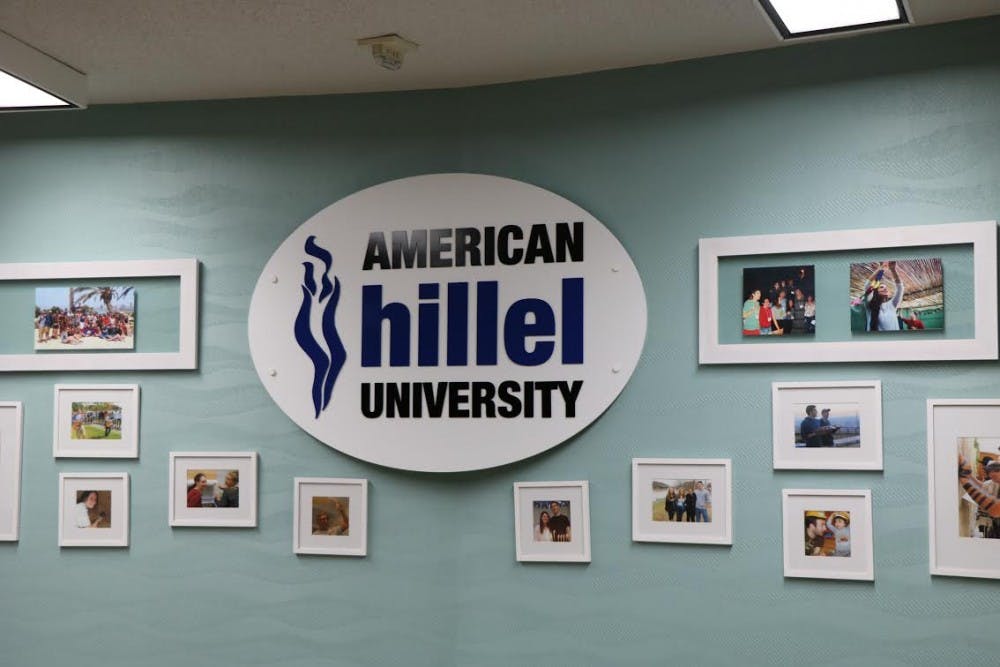In March, American University announced they would join 75 other colleges to participate in Hillel International’s Campus Climate Initiative to combat antisemitism on college campuses and strengthen Jewish student communities.
AU Hillel’s Executive Director Jason Benkendorf told The Eagle that joining the initiative will help “University leaders develop the knowledge and identify the tools and strategies to help make sure that AU is a campus where Jewish students and all students can feel safe and welcome.”
These tools include training University staff to understand Jewish identity, promoting dialogue across campus and implementing data-based curriculums. Colleges participating in the initiative are tasked with building coalitions that “combat antisemitism” as well as collaborating directly with professionals from Hillel International.
“Through the initiative, AU will gather data about the current climate for Jewish students on campus and learn about best practices and opportunities for further community engagement,” said AU’s Vice President and Chief Communications Officer Matt Bennett in a statement to The Eagle.
According to Hillel International’s website, the initiative will also help staff and faculty build programs and policy initiatives that focus on creating a community between Jewish and non-Jewish students.
Bennett said that overall joining the initiative “build[s] awareness about antisemitism, provides university leaders with better understanding about the experiences of Jewish students, and supports efforts to address hate and bias on college campuses.”
Hillel International is an international organization that seeks to “envision a world where every student is inspired to make an enduring commitment to Jewish life, learning, and Israel.” The organization’s policies also prohibit them from collaborating with any organization that supports sanctions against Israel or “denies the right of Israel to exist as a Jewish and democratic state with secure and recognized borders.”
Hillel International’s policy became especially relevant this past weekend when AU’s Student Government passed a resolution to end AU’s financial ties with Israel. The resolution was quickly struck down by AU’s President Sylvia Burwell, who released a campus-wide email condemning the resolution and stating AU would not uphold any boycotts or sanctions.
Recent student action has not stopped AU or other universities from joining Hillel International’s campaign.
Other institutions that joined the initiative this academic year include Ohio State University, Loyola Marymount University and Brooklyn College. All of these institutions, including AU, have received backlash from students for administrative inaction in response to claims of rising antisemitism.
In January, the Louis D. Brandeis Center for Human Rights Under Law and Jewish On Campus filed a Title VI complaint with the Department of Education, alleging inaction on the University’s part in stopping antisemitism on campus.
“We’ve unquestionably seen a dramatic increase in manifestations of antisemitism on campus,” Benkendorf said.
A joint study by the Anti-Defamation League and Hillel International found that 73 percent of surveyed Jewish students say they have experienced or witnessed antisemitism on their campus this year. The Israel-Hamas war has additionally sparked a rise in Islamophobia, with the Council on American-Islamic Relations reporting in January that anti-Muslim and anti-Palestinian discrimination rose 180 percent after Oct. 7.
“AU’s participation in the Hillel initiative is one of many campus-wide efforts that contribute to our ongoing work to address antisemitism and advance our inclusive excellence commitment,” Bennett said.
AU has responded to complaints of antisemitic discrimination by issuing multiple statements condemning hate speech, banning indoor protests and regulating the public statements and poster contents of AU student organizations.
The University has received intense student criticism for the decisions. AU’s Student Government on April 10 called on President-designate Jonathan Alger to rescind President Sylvia Burwell’s ban on indoor protests in two separate actions, one of which occurred during New Eagle Day.
The Foundation for Individual Rights and Expression and Palestine Legal have also denounced AU’s protest ban and “continued suppression of Palestinian student groups.”
Benkendorf said that addressing such complaints is not always a simple process though.
“Ensuring our campus is one where every student feels safe and comfortable and where every student can thrive is always a work in progress,” Benkendorf said.
Students across campus are struggling to reconcile what it means to promote inclusivity on campus, particularly as student groups such as Students for Justice in Palestine are put on probation for indoor protests.
To students dissatisfied with AU’s participation in the initiative, Benkendorf said that although a diversity of opinions is welcomed by AU Hillel, “it’s deeply problematic to suggest that AU or any institution shouldn’t engage with Jewish organizations or Jewish communities that have a connection with Israel. Israel is essential to Jewish identity.”
“I think it’s really important that folks not conflate belief in the existence of Israel as a Jewish state with political positions regarding issues of the moment right now,” Benkendorf said. “I don’t believe that it is a political position to say that we believe that Jews have a right to self-determination in part of their ancestral homeland.”
According to a 2021 poll from the Pew Research Center, 45 percent of Jewish people in America say a connection to Israel is “essential” to being Jewish for them, although less than half gave positive ratings to Israel’s conservative prime minister, Benjamin Netanyahu.
Benkendorf emphasized that it is important for students to listen to one another no matter their background and engage in conversations surrounding this crisis, even if these conversations are difficult and deeply personal.
“I know that tensions are high, but I think it's more important in moments like these than ever, that we actually talk to people who have different life experiences, who have different identities and who see the world differently,” Benkendorf said. “That's how we learn. That’s how we grow.”
This article was edited by Walker Whalen, Zoe Bell, Tyler Davis and Abigail Turner. Copy editing done by Luna Jinks, Isabelle Kravis and Ariana Kavoossi.
administration@theeagleonline.com




